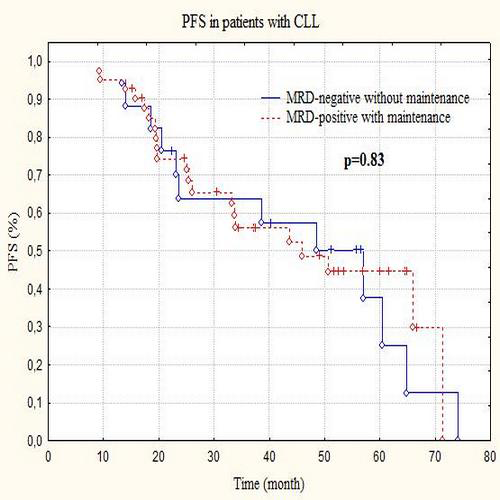Introduction. There is strong evidence that the achievement of a negative status for minimal residual disease (MRD) is the single most important factor predictive of final outcome in patients with chronic lymphocytic leukemia (CLL) both in previously untreated and relapsed patients. Maintenance treatment (MT) with the CD20-directed monoclonal antibodies rituximab or ofatumumab yields better progression-free survival (PFS) compared with observation alone in individuals with CLL who have received induction therapy with chemo-immunotherapy. However maintenance therapy of anti-CD20 antibodies, although approved in some other B-cell malignancies, is not yet approved in CLL by regulators.
Aim. We wanted to assess overall and progression-free survival in MRD-positive patients who received maintenance therapy.
Methods. The study included 58 patients (median age 62 years, range 36-82). Male to female ratio - 1.7:1. We have used NCI revised guidelines (Hallek M, et al., 2008) for treatment initiation, assessment of response and MRD. Induction chemotherapy was conducted under the following programs: RB, RFC. The median line of therapy was - 1 (1-5). Evaluation of MRD was performed using 5-color flow cytometry of the bone marrow cells. The maintenance therapy was conducted MRD-positive patients (n=41): Rituximab 500 mg/m2 intravenously every 8 weeks for 2 years. The remaining MRD-negative patients (n=17) were under dynamic observation without therapy. Median observation in study was 51.5 month (15.2-134.8).
Results.The frequency of relapses in the group of patients with MT was 51.2%, in the group of patients without MT - 70.6% (p=0.18). MRD was not detected after 6-12 months of MT in 17.1% (7/41) had previously MRD-positive patients. The medians of PFS and OS were not different in the MRD-positive patients with MT versus in the MRD-negative patients without MT: PFS - 45.9 months and 57 months, respectively (p=0.83); OS - 106 and 128 months, respectively (p=0.47). Significant differences in the incidence of infectious complications between patients with MT and without of MT were not detected (p˃0.05).
Conclusions.Maintenance therapy for MRD-positive patients allows increasing of progression-free and overall survival to the level of patients with MRD-negative status. Maintenance therapy may be a means of control over the minimal residual disease and the method of its eradication. The proposed algorithm need further testing to confirm the initial results.
Shuvaev:Novartis: Consultancy; Pfize: Honoraria; BMS: Consultancy; Fusion Pharma: Consultancy.
Author notes
Asterisk with author names denotes non-ASH members.


This feature is available to Subscribers Only
Sign In or Create an Account Close Modal